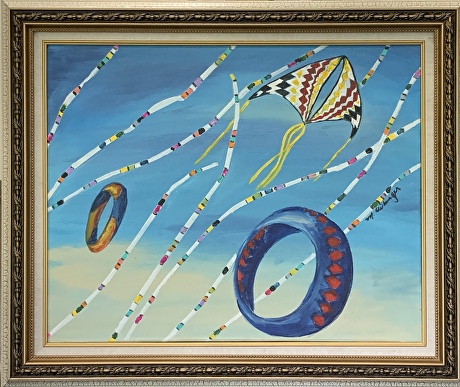
“Ancient Egyptians believed that chaos is the first and most necessary ingredient in the universe. It could sweep you away, but it was also the place from which all things start anew.” (Jodi Picoult, The Book of Two Ways).
Chaos theory is a mathematical field of study teaching that unpredictability will always remain a constant. In nature and in social behavior the systems that tie elements together are so complex that the only prediction that can reasonably be made is that life is unpredictable. Researchers who are interested in chaos study the unpredictability of behavior or nature with the aim of making it understandable.
Perhaps because it’s spring, I’ve been thinking a lot about our chaotic world. I don’t understand how conditions throughout the globe have become so dire. I yearn for a way to give it order. Like the Egyptians, I am searching for ways out and new beginnings.
From early on, chaos theorists postulated that complex systems go through changes that are rarely repeated. Scientists search for the factors that break up states of equilibrium and study what it takes to return the system to balance. Though chaos theory grew out of mathematics and applied to science, its influence is broad and includes the social sciences. I can easily apply it to my life.
For example: After giving birth to three children my family settled into a somewhat predictable routine. When an unexpected fourth child came along she interrupted the order in our daily lives. Late-night feedings and other infant cares diminished the amount of time I could spend with my older children. There were shifts in the relationships between my husband and me, the two of us and our children, and among the three older siblings. Our days became more chaotic. As time went on, we adapted and modified our schedules. After a year, equilibrium returned to our household until it was broken again by moving out of state. And so it goes. Like many people in similar situations, we never took the time to analyze in advance the potential ramifications of a change in condition.
Three features define a chaotic system.
- They are not random but are deterministic with equations ruling their behavior.
- They are sensitive to initial conditions. Slight changes in the starting point can lead to different outcomes. Small changes can lead to large ones later.
- They are not disorderly, for there is an order and pattern to chaos.
Since chaos theory emerged in the 1970s it helped answer problems in quantum mechanics and cosmology in the physical sciences. Health scientists gained a better understanding of heart arrhythmia and brain functions. It influenced toy developers who devised games like SimCity, and SimAnt.
What does this me to me, to our community, and to the nation?
It is important to realize that change does not occur in a vacuum but rather within a system. If you want the system to return quickly to a state of equilibrium after the change is made, a variety of factors must be considered and controlled.
To understand what happens when ramifications aren’t thoroughly evaluated we can look at how various governments dealt with COVID-19. The virus was unexpected worldwide, disrupting the way societies operated. New Zealand responded quickly with sequestering and mask mandates just three days after the World Health Organization raised the alarm in January 2020. By June of that year, New Zealand declared itself free of the virus. As new strains spread the country continued to respond swiftly, and though cases did escalate, they were kept under control. Auckland was recently rated as the most livable city in the world because of its response. Auckland was recently rated as the most livable city in the world because of its response.
Those with the highest death rate per 100,000 are Bulgaria, Bolivia, Lithuania, Eswatini, and Peru, countries that ignored the virus. The percentage of people wearing masks and the percent of people vaccinated are extremely low.
Scientists suggest that the COVID pandemic may be the first of many. Hopefully, countries will be better prepared for the next disruption, and citizens will be more willing to deal with it rationally.
Native Americans are taught to consider the effect of a decision on the seventh generation. To do this requires patience and a willingness to delve broadly into the potential consequences of suggestions on everything affected before making a change. I wonder how we would have handled the Iraq and Afghanistan wars if we had thought through the ramifications to their people, their environment, their art, our soldiers, informants, and our finances. The wars are vivid examples of what happens when a country reacts emotionally rather than taking the time to understand the ramifications for all involved.
Chaos brings with it fear, trauma, and uncertainty, but it also brings change, hopes, and renewal. Like springtime, plants reemerge seemingly the same, yet always different. This year, as we celebrate Easter, Passover, and Ramadan, let’s make our actions count so that the changes we initiate during the year will bring us out of darkness to a better equilibrium.
References:
Biswas,H. & Hasan, M. & Bala, S. Chaos Theory and its Applications in our Real Life. University of Barishal, Department of Mathematics. retrieved from https://bu.ac.bd/uploads/BUJ1V5I12/6.%20Hena%20Rani%20Biswas.pdf
Crossman, A. (2019) Overview to Chaos Theory in Sociology. Thought Co. retrieved from https://www.thoughtco.com/chaos-theory-3026621
Partridge-Hicks, S. (2020) 5 Countries That Are Getting Covid-19 Responses Right. Global Citizen, retrieved from https://www.globalcitizen.org/en/content/countries-with-best-covid-responses/
Howell, B. (2022) The countries who’ve Handled coronavirus the Best – and Worst. MoveHub. retrieved from https://www.movehub.com/blog/best-and-worst-covid-responses/
Do comment on my blog site below. t is always wonderful to hear from you.
Art is always for sale. For information contact me at marilynne@eichingerfineart.com.

